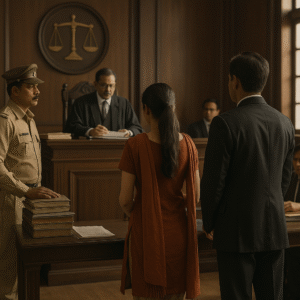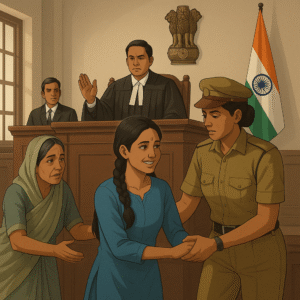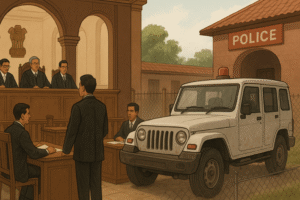Simplified Explanation of the Judgment
In a landmark ruling, the Patna High Court addressed the critical question of what constitutes “reason to believe” and “liable to confiscation” under Section 110 of the Customs Act, 1962. This case arose when Customs officials seized a truck carrying 20,650 kilograms of dried areca (betel) nuts worth nearly ₹59 lakh, suspecting them to be of foreign origin and therefore smuggled into India. The seizure was made in Bihar, away from any designated customs check post or warehouse.
The petitioners, who were registered traders and transporters under GST in Assam, argued that the goods were being legally transported from Assam to Karnataka, both within India. They produced invoices and documentation to support their claim. However, Customs authorities claimed that the physical appearance of the nuts indicated they were not of Indian origin and thus liable for confiscation.
The petitioners approached the High Court after a Single Judge dismissed their writ petition, citing laboratory suspicion and pending investigation. The matter was escalated to a Division Bench, which examined the broader principles of law.
The Court ruled that suspicion alone cannot justify seizure or confiscation. The expression “reason to believe” under the Customs Act requires objective, reasonable grounds based on credible evidence. Mere assumptions, physical appearances, or general trade practices cannot form a valid basis for confiscation. The Bench emphasized that powers under confiscatory laws like the Customs Act must be exercised strictly within statutory limits.
The Court found that there was no evidence the goods had originated from Nepal or any foreign country. Both consignor and consignee were registered Indian dealers. Since the goods were not intercepted at a customs station or notified area, and no concrete material indicated illegal importation, the Customs authorities acted without jurisdiction.
The High Court quashed the seizure memo and directed the immediate release of the goods and the vehicle. It also criticized the attempt to supplement reasons for seizure through affidavits after the fact, holding that orders must stand or fall on the reasons originally recorded.
This judgment reinforces that public authorities must act on concrete evidence, not suspicion, and safeguards legitimate trade from arbitrary seizures.
Significance or Implication of the Judgment
This decision has far-reaching implications for traders, transporters, and customs authorities:
- For traders: It provides strong protection against arbitrary seizures of goods during inter-state trade. Documentation such as GST invoices and consignor-consignee records carry substantial weight.
- For customs authorities: It establishes clear limits on their powers, emphasizing that seizures must be based on reasonable belief supported by material evidence, not presumptions.
- For the judiciary: The ruling reinforces the principle of judicial consistency, warning against deviation from earlier binding precedents on identical issues.
- For the economy: It reassures businesses engaged in the lawful trade of agricultural products that they will not face unnecessary harassment under customs law.
By clarifying the legal threshold of “reason to believe,” the Court ensures accountability in enforcement and prevents misuse of confiscatory powers.
Legal Issue(s) Decided and the Court’s Decision with reasoning
- What is the meaning of “reason to believe” under Section 110 of the Customs Act?
- Court’s Decision: It requires objective, rational grounds, not mere suspicion.
- Reasoning: Belief must be held in good faith and based on relevant material, not arbitrary assumptions.
- Whether suspicion about the origin of goods is enough for confiscation?
- Court’s Decision: No.
- Reasoning: Mere suspicion or visual inspection cannot establish foreign origin of goods. No evidence indicated smuggling from Nepal.
- Can reasons for seizure be supplemented later through affidavits?
- Court’s Decision: No.
- Reasoning: Orders must be judged on the reasons recorded at the time, not supplemented later.
- Whether Customs had jurisdiction to seize the goods?
- Court’s Decision: No.
- Reasoning: Goods were seized within Indian territory, transported between two Indian states, and not intercepted at a customs station.
- Final outcome?
- Court’s Order: Seizure memo quashed, goods and vehicle to be released immediately.
Judgments Referred by Parties
- M/s Ayesha Exports v. Union of India, CWJC No. 7589 of 2018
- Yamuna Trading Company v. Union of India, CWJC No. 317 of 2012
- Salsar Transport Company v. Union of India, CWJC No. 3784 of 2013
- Union of India v. Salsar Transport Company, MJC No. 2185 of 2013, LPA No.1186 of 2013
Judgments Relied Upon or Cited by Court
- Tata Chemicals Ltd. v. Commissioner of Customs (Preventive), Jamnagar, (2015) 11 SCC 628
- Assistant Collector of Customs v. Charan Das Malhotra, (1971) 1 SCC 697
- Kewal Krishan v. State of Punjab, AIR 1967 SC 737
- Hukma v. State of Rajasthan, AIR 1965 SC 476
- Aslam Mohammad Merchant v. Competent Authority, (2008) 14 SCC 186
- Mohinder Singh Gill v. Chief Election Commissioner, AIR 1978 SC 851
- Calcutta Discount Co. Ltd. v. ITO, AIR 1961 SC 372
- Sheo Nath Singh v. CIT, (1972) 3 SCC 234
- Indian Nut Products v. Union of India, (1994) 4 SCC 269
- Bawa Gopal Das Bedi & Sons v. Union of India, AIR 1982 Pat 152
Case Title
M/s Ramesh Kumar Baid and Sons (HUF) & Anr. v. Union of India & Ors.
Case Number
Letters Patent Appeal No. 1302 of 2019 in CWJC No. 6563 of 2019
Citation(s)
2020 (3) PLJR 98
Coram and Names of Judges
- Hon’ble The Chief Justice Sanjay Karol
- Hon’ble Mr. Justice Anil Kumar Upadhyay
Names of Advocates and who they appeared for
- For the Appellants: Mr. Y. V. Giri, Senior Advocate; Mr. Amit Kumar Mishra, Mr. Amit Pandey, Advocates
- For the Respondents: Mr. S. D. Sanjay, Additional Solicitor General; Mr. Anshuman Singh, Advocate
Link to Judgment
https://patnahighcourt.gov.in/viewjudgment/MyMxMzAyIzIwMTkjMSNO-PdlEWF–am1–lc2s=
If you found this explanation helpful and wish to stay informed about how legal developments may affect your rights in Bihar, you may consider following Samvida Law Associates for more updates.








